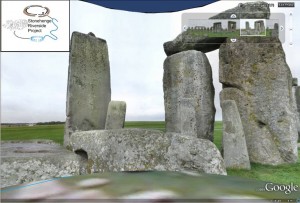Google Under-the-Earth: Seeing Beneath Stonehenge is the first application of its kind to transport users around a virtual prehistoric landscape, exploring the magnificent and internationally important monument, Stonehenge.
The application was developed by Bournemouth University archaeologists, using new field data gathered during their work with colleagues from the universities of Sheffield, Manchester, Bristol, Southampton and London as part of the Stonehenge Riverside Project. Google Under-the-Earth works by adding layers of archaeological information to Google Earth technology.
The unique visual experience lets users interact with the past like never before. Highlights include taking a visit to the Neolithic village of Durrington Walls, a trip inside a prehistoric house and the opportunity to see reconstructions of Bluestonehenge at the end of the Stonehenge Avenue and of the great timber monument called the Southern Circle, as they would have looked more than four thousand years ago.
The project is funded by the Arts and Humanities Research Council (AHRC) and Google Research Awards, a program which fosters relationships between Google and the academic world as Google fulfils its mission to ‘organize the world’s information and make it universally accessible and useful.’
But this fabulous educational and cultural tool does not end with Stonehenge. Archaeological scientist Dr Kate Welham, project leader at Bournemouth University, explained that it is the start of something much bigger.
“It is envisaged that Google Under-the-Earth: Seeing Beneath Stonehenge could be the start of a new layer in Google Earth. Many of the world’s great archaeological sites could be added, incorporating details of centuries’ worth of excavations as well as technical data from geophysical and remote sensing surveys in the last 20 years,” she said.
Dr Nick Snashall, National Trust Archaeologist for Stonehenge and Avebury World Heritage Site, said: “The National Trust cares for over 2000 acres of the Stonehenge Landscape. Seeing Beneath Stonehenge offers exciting and innovative ways for people to explore that landscape. It will allow people across the globe, many of whom may never otherwise have the chance to visit the sites, to share in the thrill of the discoveries made by the Stonehenge Riverside team and to appreciate the remarkable achievements of the people who built and used the monuments.”
You can download the application from the Google Under-the-Earth: Seeing Beneath Stonehenge site. The tool is easy to use and requires Google Earth to be installed on your computer.
 Last week, Professor Mark Llewellyn – Head of Research for the AHRC came to BU.
Last week, Professor Mark Llewellyn – Head of Research for the AHRC came to BU. 





 The
The 














 Missing Persons Indicator Project Recruitment
Missing Persons Indicator Project Recruitment Celebrating our Research: Postgraduate Research Showcase 2026
Celebrating our Research: Postgraduate Research Showcase 2026 Nursing Research REF Impact in Nepal
Nursing Research REF Impact in Nepal Fourth INRC Symposium: From Clinical Applications to Neuro-Inspired Computation
Fourth INRC Symposium: From Clinical Applications to Neuro-Inspired Computation ESRC Festival of Social Science 2025 – Reflecting back and looking ahead to 2026
ESRC Festival of Social Science 2025 – Reflecting back and looking ahead to 2026 3C Event: Research Culture, Community & Cookies – Tuesday 13 January 10-11am
3C Event: Research Culture, Community & Cookies – Tuesday 13 January 10-11am ECR Funding Open Call: Research Culture & Community Grant – Application Deadline Friday 12 December
ECR Funding Open Call: Research Culture & Community Grant – Application Deadline Friday 12 December MSCA Postdoctoral Fellowships 2025 Call
MSCA Postdoctoral Fellowships 2025 Call ERC Advanced Grant 2025 Webinar
ERC Advanced Grant 2025 Webinar Horizon Europe Work Programme 2025 Published
Horizon Europe Work Programme 2025 Published Update on UKRO services
Update on UKRO services European research project exploring use of ‘virtual twins’ to better manage metabolic associated fatty liver disease
European research project exploring use of ‘virtual twins’ to better manage metabolic associated fatty liver disease